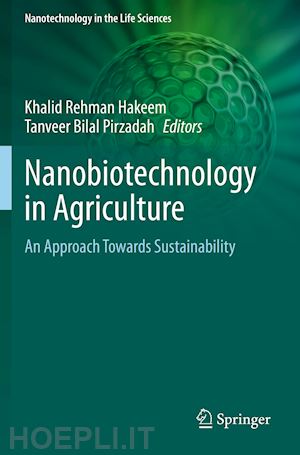
Questo prodotto usufruisce delle SPEDIZIONI GRATIS
selezionando l'opzione Corriere Veloce in fase di ordine.
Pagabile anche con Carta della cultura giovani e del merito, 18App Bonus Cultura e Carta del Docente
Agriculture is considered as a backbone of developing nations as it caters the needs of the people, directly or indirectly. The global agriculture currently faces enormous challenges like land degradation and reduced soil fertility, shrinking of land, low production yield, water accessibility and a dearth of labor due to evacuation of individuals from farming. Besides, the global population increases at an exponential rate and it is predicted that the global population will be 9 billion by 2050 that in turn leads to food crisis in near future. Although, green revolution revolutionizes the agriculture sector by enhancing the yield but it was not considered as a sustainable approach. Exorbitant use of chemical fertilizers and pesticides to boost the crop yield is definitely not a convenient approach for agriculture sustainability in the light of the fact that these chemical fertilizers are considered as double-edged sword, which on one hand enhance the crop yield but at the same time possess deleterious effect on the soil microflora and thus declines its fertility. Besides, it cause irreversible damage to the soil texture and disrupts the equilibrium in the food chain across ecosystem, which might in turn lead to genetic mutations in future generations of consumers. Thus, the increased dependence on fabricated agricultural additives during and post green revolution has generated serious issues pertaining to sustainability, environmental impact and health hazards. Therefore, nano-biotechnology has emerged as a promising tool to tackle the above problems especially in the agriculture sector. Nano-agribusiness is an emerged field to enhance crop yield, rejuvenate soil health, provide precision farming and stimulate plant growth. Nano-biotechnology is an essential tool in modern agriculture and is considered as a primary economic driver in near future. It is evaluated that joining of cutting edge nanotechnology in agribusiness would push the worldwide monetary development to approximately US$ 3.4 trillion by 2020 which clearly indicates that how agri-nanobiotechnology plays a pivotal role in the agricultural sector, without any negative impact on the environment and other regulatory issues of biosafety. Agri-nanobiotechnology is an innovative green technology, which provides the solution to global food security, sustainability and climate change. The current book is presenting the role of nano-biotechnology in modern agriculture and how it plays a pivotal role to boost the agri-business.
Assistant Professor
University Centre for Research and Development (UCRD)
Chandigarh University, Mohali, Punjab, India











Il sito utilizza cookie ed altri strumenti di tracciamento che raccolgono informazioni dal dispositivo dell’utente. Oltre ai cookie tecnici ed analitici aggregati, strettamente necessari per il funzionamento di questo sito web, previo consenso dell’utente possono essere installati cookie di profilazione e marketing e cookie dei social media. Cliccando su “Accetto tutti i cookie” saranno attivate tutte le categorie di cookie. Per accettare solo deterninate categorie di cookie, cliccare invece su “Impostazioni cookie”. Chiudendo il banner o continuando a navigare saranno installati solo cookie tecnici. Per maggiori dettagli, consultare la Cookie Policy.